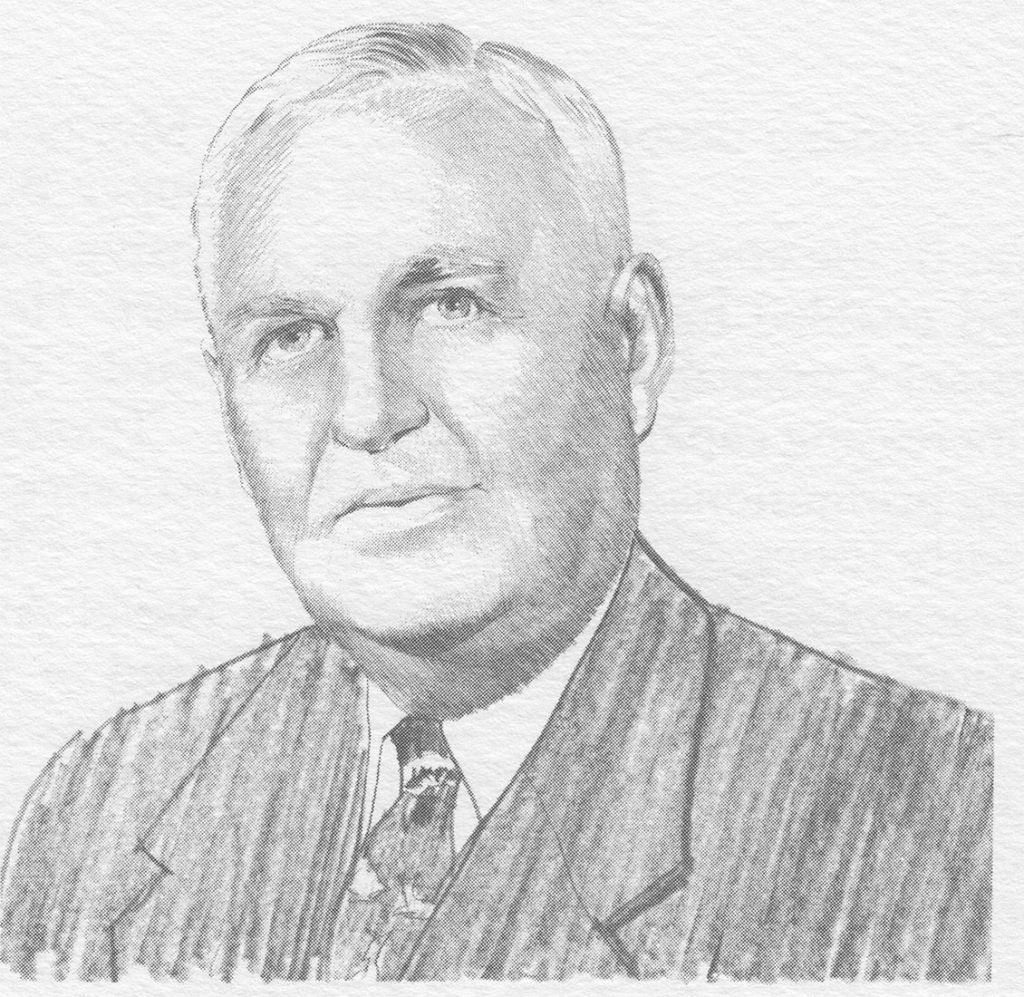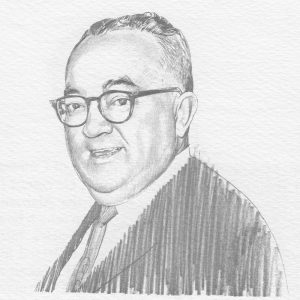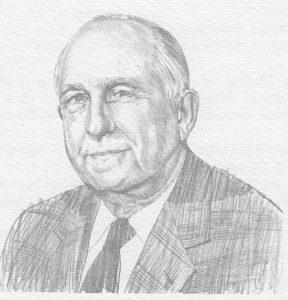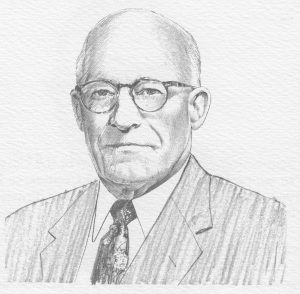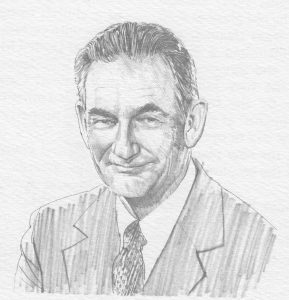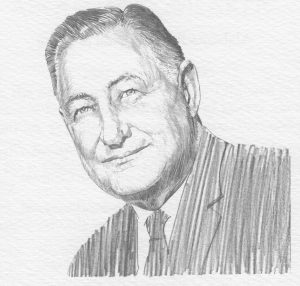But the then thirty-four-year-old Mobile attorney saw phenomenal opportunities in J. A. Morrison’s nontraditional idea for establishing a cafeteria that would employ waiters to carry customers’ trays. He advanced Morrison $800. With a handshake, the nation’s largest and most dynamic cafeteria chain was born, and George Cabell Outlaw’s highly influential business and devoted public career was begun.
George Cabell Outlaw, son of Tiberius Gracchus and Belle (Garner) Outlaw, was born in Mobile, Alabama, in 1886. After completing his secondary education at the University Military School in Mobile, he attended the University of Virginia and transferred to The University of Alabama Law School where he received his degree in 1917. After serving two years with the FBI during World War I, he opened a law practice in Mobile in 1919.
In October 1920, he married Mayme Ricks from Texas, a lady whose influence he was always to credit for his highly respected balanced and prudent judgment, generosity, mild temper, and gentleman’s bearing. In the spring of 1920, he also embarked on a business venture which shaped his career.
The Morrison’s Cafeteria opened on the corner of St. Emanuel and Conti Streets in downtown Mobile in September 1920. The cafeteria suddenly became the startling answer to the businessman’s meal problem – convenient service with low prices. Under Mr. Morrison’s expert guidance in food preparation and operations and Mr. Outlaw’s astute, professional guidance in business management, the cafeteria soon began serving three meals a day and became known as “the family cafeteria.”
With such a success beyond either Mr. Morrison’s or Mr. Outlaw’s immediate expectations, Mr. Outlaw examined other markets for a Morrison’s Cafeteria and found them in Pensacola, Florida, and Montgomery, Alabama. Morrison’s Cafeterias Consolidated was formed, with Mr. Morrison as President and Mr. Outlaw, as Secretary-Treasurer. By 1927, the new corporation had opened thriving cafeterias in three more cities-Jacksonville, Florida; Savannah, Georgia; and New Orleans, Louisiana. In seven short years, Mr. Outlaw’s faith in Mr. Morrison’s “outlandish” idea had been justified. Morrison’s Cafeteria was a fully incorporated, successful enterprise with cafeterias in six southern cities.
In 1928, Mr. Outlaw made a decision that paved a way for further expansion of Morrison’s Cafeterias Consolidated, Inc. Sale of public stock brought outside capital into the enterprise and enabled the corporation to continue to grow. Four more cafeterias were opened in Florida-in Tampa, St. Petersburg, Orlando, and West Palm Beach.
Even during the Great Depression, the bustling southern cafeteria chain proceeded unhindered, providing people in every financial class with savings in meal tabs. The cafeterias provided breakfast for a nickel, lunch for an average of thirty-five cents, and free ice cream and cake on Thursday “Family Nights.” Thousands of people in every cafeteria city were gaining “the Morrison habit.”
In 1933, Mr. Outlaw was recognized for his contribution to the nation’s restaurant business by being named a charter board member of the National Restaurant Association. In 1935, Mr. Outlaw terminated his law practice to concentrate fully on his business career with Morrison’s Cafeterias. For the next twenty years, he provided sagacious and imaginative direction to the development of the enterprise.
Early in the 1930s, Secretary-Treasurer Outlaw directed that cost control practices and procedures of all cafeterias be standardized. The centralization was so efficient and economical that each cafeteria could offer a greater variety of food at much lower prices. He also implemented the installation of central air conditioning units in all cafeterias-a progressive and unique decision that enhanced the company’s reputation for imaginative customer service.
During the 1940s, he continued as Secretary-Treasurer after Mr. J. A. Morrison, the creator of the Morrison dining concept, sold his interest in the company and retired in Florida.
When World War II created a manpower shortage, Mr. Outlaw adapted the company’s operations (applying financial restraint in incurring debts) to continue the tradition of customer service in all units. Consequently, in 1945, a new cafeteria would be opened in Lakeland, Florida. In 1947, ‘The Cafeteria of Tomorrow” created from an old, crowded facility in Tampa-dazzled the public with its innovative and imaginative, modern design and also brought recognition to Morrison’s at the National Convention of the National Restaurant Association. The citizens of Florida never had a chance to catch their breath. Other cafeterias were quickly opened in strategic tourist centers.
Once more, the combination of Mr. Outlaw’s keen business judgment and good taste bore fruit. Working with the President, Mr. Outlaw counseled the organization of providing cost control through a network of wholly-owned subsidiary companies, which today supply Morrison, Inc. with nearly all its needs. This vertical integration made the firm one of the nation’s most self-sufficient.
By the 1950s, Mr. Outlaw had turned more of the authority in running the company over to younger men-two of whom were his sons, George Cabell, Jr., and Arthur. Though less active in management decisions, he maintained a counselor role in all business affairs. In 1952, he was instrumental in the formation of Morrison Food Services-a division that today is contracted to serve over 300 institutions, including hospitals and nursing homes, office facilities, industrial complexes, and school systems and universities.
Through the years, much of Mr. Outlaw’s energy was channeled into the development of the cafeteria/ food service that he was so instrumental in founding. But, he also worked ceaselessly in creating an economic atmosphere to lure industry and business to his native city. For a number of years, he served as President of the Mobile Area Chamber of Commerce.
He was equally prominent in fostering the betterment of his fellow citizens by his participation in charitable and church activities.
When George Cabell Outlaw, Sr., died on July 16, 1964, after a brief illness, newspapers, and magazines extolled his virtues as a lawyer-businessman of great ability and foresight, the co-founder of an immensely successful business enterprise, and a man who served his community and fellowman.

